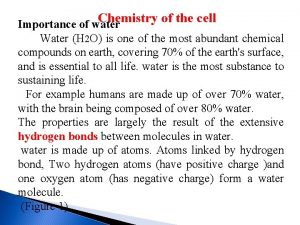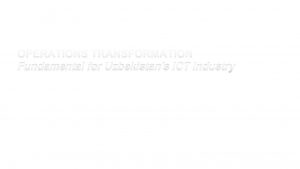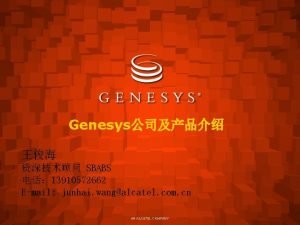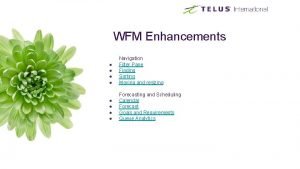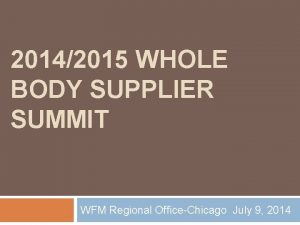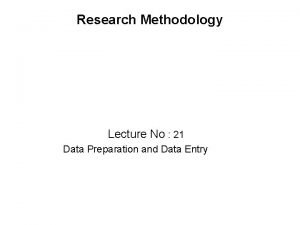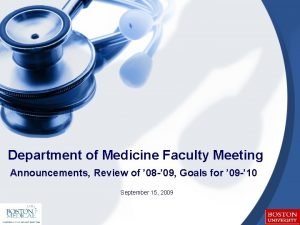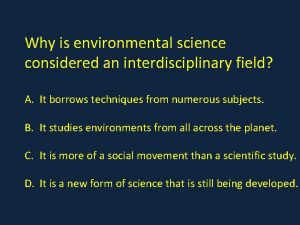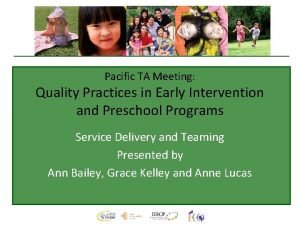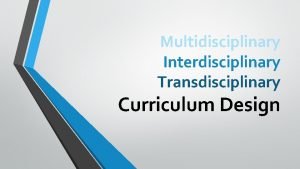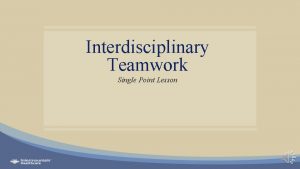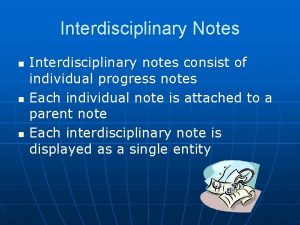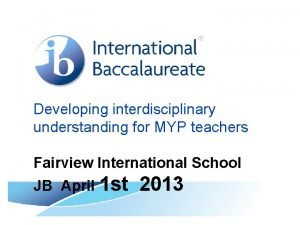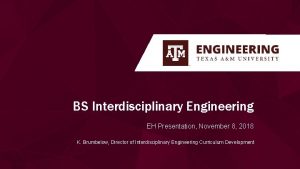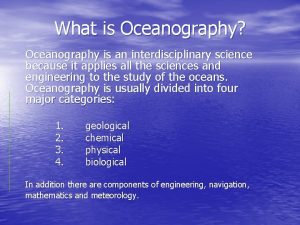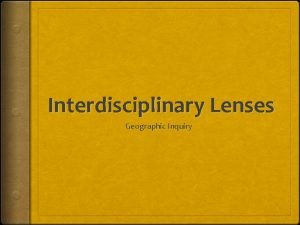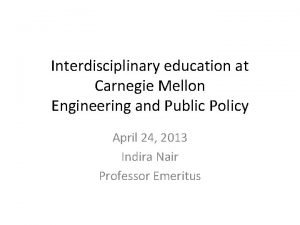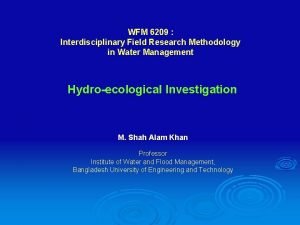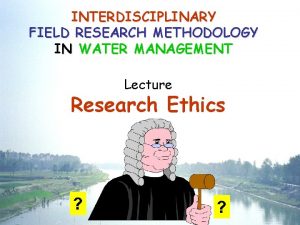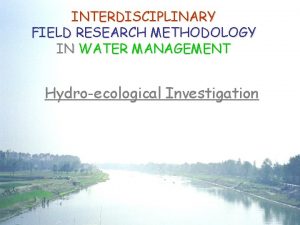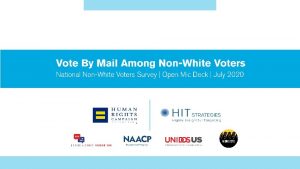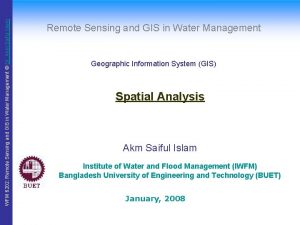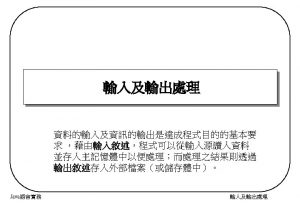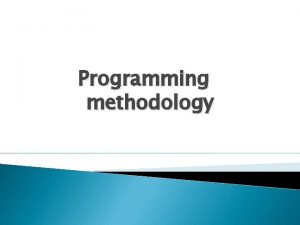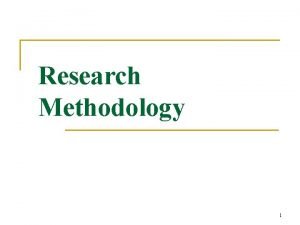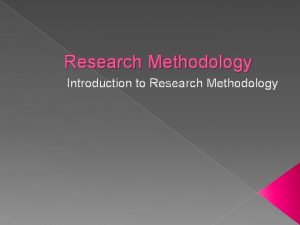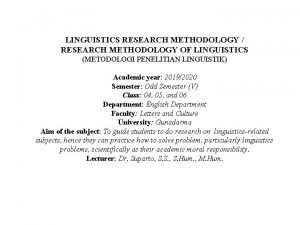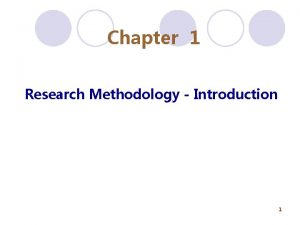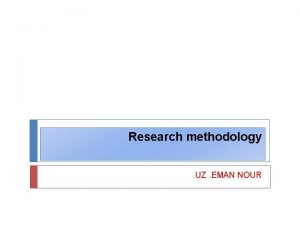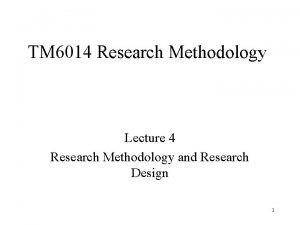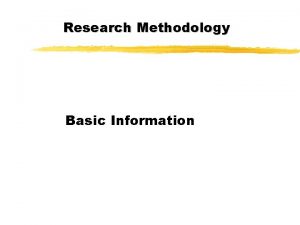WFM 6209 Interdisciplinary Field Research Methodology in Water





















- Slides: 21

WFM 6209 Interdisciplinary Field Research Methodology in Water Management Research Concept Development for Field Practical M. Shah Alam Khan Professor Institute of Water and Flood Management, Bangladesh University of Engineering and Technology

Research Concept Development Research … systematically seeking answer to a question (and a set of logically-linked sub-questions) There will be a Central Question of the ‘Research Team’ (the whole class) The Central Question of each group will be a subquestion of the Central Question of the Research Team. Each group will have a set of sub-questions to answer the group’s central question.

Research Concept Development How do we prepare for the research? What do we need? § § Question(s) Conceptual framework Methodological framework Research Proposal

Research Concept Development The Parts of a Proposal § Conceptual Part: What are you going to investigate? Why are you going to investigate it? How is the subject demarcated? § Technical Part: What data are you going to collect? Where are you going to collect your data? When are you going to collect your data?

Research Concept Development To get a first idea … § § Describe the SITUATION Explain what the PROBLEM is Formulate your (central) QUESTION about it Explain what your RESPONSE(S) will be Note: Length of the ‘SPQR’ should be about one type-written page.

Research Concept Development Example SPQR: ‘Kaliakoir’ § SITUATION Industrial effluent from various industries are flowing into the water bodies including the khals and beels. The fisher folks are being affected because of the water pollution.

Research Concept Development Example SPQR: ‘Kaliakoir’ § PROBLEM Because of the reduced availability of fish (quantity, quality, variety) and health problems, the fisher folks find it difficult to live on their livelihood.

Research Concept Development Example SPQR: ‘Kaliakoir’ § QUESTION What are the fisher folks doing to mitigate the water pollution problems?

Research Concept Development Example SPQR: ‘Kaliakoir’ § RESPONSE Interview and group discussion: different fisher folk groups

Research Concept Development So, we begin with the ‘SPQR’ of the field practical. But first we need an overview of the study area … …

Field Practical: The Central Question § All student groups will work around a ‘central research question’ of the whole research team. § Each of the research questions of the sub-groups will address interdisciplinarity and will be of sociotechnical design. § The central research question of the whole research team will be: How did/do the technical, agronomic, environmental, organizational and socio-legal/political dimensions of water management shape the actual water management pattern (design, organization, allocation and actual delivery) and how do these dimensions interact at different levels of the water management system?

Field Practical: Broad Areas of Sub-groups Each student group will work in one of the following broad areas of research through developing and addressing the group’s central research question (a ‘sub-question’ of the central research question of the whole research team), and a set of logicallylinked sub-questions for the group. 1. 2. 3. 4. Institutional arrangement for water management Performance of irrigation system Environment, ecosystem and livelihood Water use and user conflicts

SPQR: Field Practical § Group Discussion § Group Assignment § Presentation, Discussion and Feedback in next class

The Conceptual Part of a Proposal § Introduction (based on SPQR) § Objectives (what the research wants to achieve) SMART: Specific, Measurable, Agreed-upon, Realistic, Time-bound § Question Efficiency: what do you actually need to know? Steering: where do you find the data? § Concepts (explanation of concepts and theories)

The Conceptual Part of a Proposal Conceptual Framework Identifies and defines a set of relevant concepts in relation to a research question. It clarifies the relation among those concepts. It demonstrates their relevance and the way in which they will be used to analyze the findings. e. g. ‘Vulnerability’ can be conceptualized as either exposure of the system to hazards, or an intrinsic systemic property characterized by ‘sensitivity’ , ‘adaptive capacity’, etc. The methodological framework will be guided by these concepts.

The Conceptual Part of a Proposal Conceptual Framework: Example The water conservation system should be analyzed as a sociotechnical system. The design of infrastructure is based on the ideas and interests that people had and have with respect to its use. And the other way around, once these social interests and ideas have been materialized in the layout, in structures and in other technical irrigation facilities, the infrastructure requires specific forms of organization and social control in order to function as intended. The research wants to analyze the planned and actual functioning of water management, and see how technical, economic, social and political factors influenced past and present design and management decisions.

Research Questions and Conceptual Framework: Field Practical § Group Discussion § Group Assignment § Presentation, Discussion and Feedback in next class

End of Part 1

The Technical Part of a Proposal § Materials: What are your sources of information? Can you access those? § Strategy: General or in-depth? Measurements? Interviews? Experiments? § Planning: When are you going to do what? (Remember, you will have 5 days in the field. So think practically of what you can and cannot realize)

The Research Proposal § § § § Title page Introduction Objective(s) Research Question (and sub-questions) Conceptual framework Methodology Work plan References

The Research Proposal Things to Remember: § Writing a research proposal is an iterative process – you cannot write a proposal from A to Z in one shot. § You move forward and backward, and again forward – a matter of optimization. § Final proposals are to be submitted after fine tuning at the end of Day 1 of field practical.
 Water and water and water water
Water and water and water water Interdisciplinary field
Interdisciplinary field Sdm wfm
Sdm wfm Wfm impact 360
Wfm impact 360 Sbabs
Sbabs Phantom wfm
Phantom wfm Wfm regions
Wfm regions Data preparation process in research methodology
Data preparation process in research methodology The qualitative field research interview is typically:
The qualitative field research interview is typically: Evans center for interdisciplinary biomedical research
Evans center for interdisciplinary biomedical research A science is considered interdisciplinary when weegy
A science is considered interdisciplinary when weegy Multidisciplinary vs interdisciplinary
Multidisciplinary vs interdisciplinary Transdisciplinary curriculum
Transdisciplinary curriculum Interdisciplinary teamwork
Interdisciplinary teamwork Interdisciplinary progress notes
Interdisciplinary progress notes Integrated unit design
Integrated unit design What is interdisciplinary
What is interdisciplinary Interdisciplinary studies ucf
Interdisciplinary studies ucf Interdisciplinary engineering tamu
Interdisciplinary engineering tamu Is oceanography an interdisciplinary science
Is oceanography an interdisciplinary science Interdisciplinary lenses
Interdisciplinary lenses Carnegie mellon interdisciplinary
Carnegie mellon interdisciplinary
